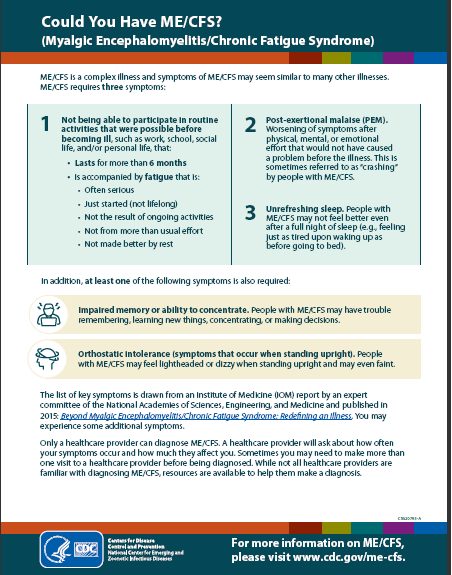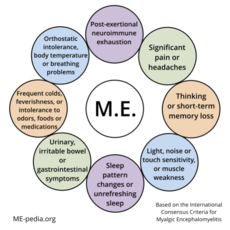Myalgic Encephalomyelitis (ME) is a complex and debilitating neurological condition. It causes profound fatigue and a range of other symptoms, often worsened by physical or mental activity.
ME can impact a person’s ability to carry out daily tasks and may persist for years. This condition is poorly understood, with no specific diagnostic tests or universally effective treatments. As a result, individuals with ME often face significant challenges in accessing appropriate medical care and support.
The exact cause of ME remains unknown, and research efforts continue to unravel the underlying mechanisms of this condition. Despite its significant impact on the lives of those affected, ME has historically been under-recognized and underfunded, highlighting the need for greater awareness and understanding of this condition.

Credit: www.cdc.gov
Demystifying Myalgic Encephalomyelitis
Unravel the complexities of Myalgic Encephalomyelitis, shedding light on this chronic illness affecting energy levels and overall well-being. Understanding the symptoms and management strategies can empower individuals navigating this condition.
Myalgic Encephalomyelitis (ME), also known as Chronic Fatigue Syndrome (CFS), is a complex and debilitating illness that affects millions of people worldwide. Despite being recognized by the World Health Organization as a neurological illness since 1969, ME/CFS remains poorly understood and often misdiagnosed. In this article, we will demystify ME/CFS by exploring the basics of the illness, its symptoms, and diagnosis.
The Basics Of Me/cfs
ME/CFS is a chronic illness that affects multiple bodily systems, including the immune, neurological, and metabolic systems. It is characterized by profound fatigue, cognitive dysfunction, and a range of other symptoms that worsen with exertion. The exact cause of ME/CFS is unknown, but it is believed to involve a combination of genetic, environmental, and infectious factors.
Symptoms And Diagnosis
The symptoms of ME/CFS can vary widely from person to person, but typically include:
- Severe fatigue that is not relieved by rest
- Post-exertional malaise (PEM), which is a worsening of symptoms after physical or mental exertion
- Cognitive impairment, such as brain fog, difficulty concentrating, and memory problems
- Orthostatic intolerance, which is a worsening of symptoms upon standing
- Sleep disturbances, including insomnia and hypersomnia
- Pain, including headaches, joint pain, and muscle pain
- Sensitivity to light, sound, and other stimuli
- Gastrointestinal problems, such as irritable bowel syndrome (IBS)
Diagnosing ME/CFS can be challenging as there are no specific tests or biomarkers for the illness. Instead, diagnosis is based on a thorough medical history, physical examination, and ruling out other possible causes of the symptoms. The diagnostic criteria for ME/CFS include:
- Severe fatigue lasting for at least 6 months
- Post-exertional malaise
- Cognitive impairment
- Orthostatic intolerance
- At least one other symptom, such as pain, sleep disturbances, or sensitivity to stimuli
In conclusion, ME/CFS is a complex and often misunderstood illness that can have a profound impact on a person’s life. By understanding the basics of the illness, its symptoms, and diagnosis, we can help to demystify ME/CFS and improve the lives of those living with this debilitating condition.
Tracing The Origins
Tracing the Origins of Myalgic Encephalomyelitis brings us to a journey through history and the latest research findings.
Historical Perspective
The history of Myalgic Encephalomyelitis dates back to the 1950s, with outbreaks resembling polio cases.
The condition was initially termed “atypical polio” before being recognized as a distinct illness.
Current Research And Theories
Modern research suggests viral infections, immune dysfunction, and genetic predisposition as potential factors.
Emerging theories explore mitochondrial dysfunction and neuroinflammation as contributors to the disease.
Living With Chronic Fatigue
Daily Impact On Patients
For those living with Myalgic Encephalomyelitis (ME), the daily impact of chronic fatigue is profound. Simple tasks like getting out of bed or preparing a meal can feel like insurmountable challenges. The relentless exhaustion and pervasive weakness can severely limit a person’s ability to function, often resulting in a significant decrease in overall quality of life.
Personal Stories And Testimonies
Personal stories and testimonies from individuals living with ME provide invaluable insight into the harsh realities of this condition. Many share their experiences of struggling to cope with the overwhelming fatigue that permeates every aspect of their lives. These firsthand accounts serve as a powerful reminder of the daily battles faced by those with chronic fatigue, shedding light on the often invisible but debilitating nature of this illness.

Credit: www.nature.com
Medical Community’s Role
The medical community plays a crucial role in understanding and treating Myalgic Encephalomyelitis, a complex condition. By conducting research and providing support, healthcare professionals contribute significantly to improving the lives of ME patients.
Medical Community’s Role The medical community plays a crucial role in understanding and addressing Myalgic Encephalomyelitis (ME), a complex and debilitating condition. Physicians, researchers, and healthcare providers are essential in improving the diagnosis and treatment of ME. Their collaboration, knowledge, and dedication are pivotal in enhancing the lives of individuals affected by this condition. Diagnosis Challenges Diagnosing ME poses significant challenges due to the lack of specific laboratory tests or biomarkers. Healthcare professionals rely on clinical assessments and ruling out other conditions. This process can be frustrating for patients and may lead to misdiagnosis or delayed diagnosis. Increased awareness and updated diagnostic guidelines are essential to improve the accuracy and timeliness of ME diagnosis. Treatment Options When it comes to treatment options for ME, the medical community focuses on symptom management and supportive care. This approach aims to alleviate symptoms such as pain, fatigue, and cognitive impairment. Collaborative efforts among healthcare providers and patients are crucial in developing personalized treatment plans that address the unique needs of individuals with ME.
Holistic And Alternative Therapies
When it comes to managing Myalgic Encephalomyelitis (ME), many individuals explore holistic and alternative therapies to alleviate symptoms and improve overall well-being. These approaches focus on treating the whole person, addressing physical, mental, and emotional aspects of health. While these therapies may not cure ME, they can provide valuable support and relief from the condition.
Diet And Nutrition
Diet and nutrition play a crucial role in managing ME symptoms. A balanced diet rich in nutrient-dense foods can help support the body’s immune system and energy levels. Eliminating processed foods and sugary snacks can reduce inflammation and prevent energy crashes. Including anti-inflammatory foods like fruits, vegetables, and omega-3 fatty acids can aid in managing pain and fatigue.
Mind-body Practices
Mind-body practices such as meditation, yoga, and tai chi can help individuals with ME manage stress, improve sleep quality, and reduce pain. These practices focus on mindfulness and relaxation, which can positively impact the nervous system and overall well-being. Engaging in gentle movement exercises can also prevent muscle stiffness and improve mobility.

Credit: me-pedia.org
Navigating Social Dynamics
Myalgic Encephalomyelitis, also known as Chronic Fatigue Syndrome, can significantly impact an individual’s social dynamics. Navigating social interactions and relationships while managing the symptoms of this condition can be challenging. Here’s a closer look at some key aspects of managing social dynamics when living with Myalgic Encephalomyelitis.
Support Systems
Building a strong support system is crucial for individuals with Myalgic Encephalomyelitis. Family and friends play a vital role in providing emotional support and understanding. Joining support groups and connecting with others who have the same condition can also offer a sense of community and shared experiences.
Dealing With Misconceptions
Misconceptions about Myalgic Encephalomyelitis can lead to misunderstandings and stigma. Educating others about the condition and its impact can help dispel myths and promote empathy. Communicating openly and honestly about personal experiences can also aid in addressing misconceptions.
Advancements In Me/cfs Research
Recent advancements in ME/CFS research have brought hope to those affected by Myalgic Encephalomyelitis. Scientists are making significant progress in understanding the underlying mechanisms of the condition, paving the way for potential treatments and improved quality of life for patients.
Exciting developments in this field are offering renewed optimism for the future management of ME/CFS.
Myalgic Encephalomyelitis, commonly known as Chronic Fatigue Syndrome (ME/CFS), has long been a challenging condition to understand and treat. Recent studies and potential breakthroughs in ME/CFS research are shedding light on this complex illness.
Recent Studies
Recent studies have focused on immunological dysregulation and neuroinflammation in ME/CFS patients. Researchers are exploring the role of cytokines and autoantibodies in the development of symptoms.
Potential Breakthroughs
Exciting potential breakthroughs include the identification of biomarkers that could aid in diagnosis and treatment. Metabolic abnormalities and microbiome composition are also areas of interest for researchers. By understanding the latest research in ME/CFS, we move closer to unlocking the mysteries of this debilitating condition and improving the lives of those affected.
Future Outlook
The future outlook for Myalgic Encephalomyelitis holds promise for advancements in diagnosis and treatment, offering hope for improved quality of life for patients. Ongoing research and increased awareness are paving the way for a better understanding of this complex illness, leading to potential breakthroughs in managing its symptoms.
Myalgic Encephalomyelitis, also known as Chronic Fatigue Syndrome, is a debilitating condition that affects millions of people worldwide. While there is currently no cure for ME/CFS, there is hope for the future. In this section, we will discuss the emerging treatments, advocacy, and awareness efforts that give us reason to be optimistic about the future of ME/CFS.
Emerging Treatments
There has been a growing interest in researching and developing treatments for ME/CFS. Some of the emerging treatments include:
- Immunomodulators: These drugs aim to regulate the immune system, which is believed to play a role in the development of ME/CFS.
- Antivirals: Some researchers believe that ME/CFS may be caused by a viral infection, and antiviral medications may be effective in treating the condition.
- Exercise Therapy: While exercise can exacerbate symptoms in some patients, others have reported improvement with graded exercise therapy, which involves gradually increasing physical activity over time.
While more research is needed to determine the efficacy of these treatments, the fact that there are multiple avenues being explored is promising for the future of ME/CFS treatment.
Advocacy And Awareness
Another reason to be optimistic about the future of ME/CFS is the growing advocacy and awareness efforts. More and more people are speaking out about their experiences with ME/CFS, and organizations are working to increase funding for research and treatment. Some of the advocacy and awareness efforts include:
- Millions Missing: This global campaign aims to raise awareness about ME/CFS and demand more funding for research and treatment.
- Open Medicine Foundation: This organization funds research into ME/CFS and advocates for increased awareness and funding.
- ME Action: This organization works to empower people with ME/CFS and advocates for better treatment and research.
These efforts are crucial in raising awareness about ME/CFS and ensuring that it receives the attention and resources it deserves. In conclusion, while there is currently no cure for ME/CFS, the future outlook is promising. With emerging treatments being developed and growing advocacy and awareness efforts, there is hope that we will one day have effective treatments and a better understanding of this debilitating condition.
Frequently Asked Questions
What Triggers Myalgic Encephalomyelitis?
Triggers for myalgic encephalomyelitis can include viral infections, genetic predisposition, and environmental factors. Stress and immune system dysfunction also play a role.
What Is The Life Expectancy For Someone With Myalgic Encephalomyelitis?
Individuals with myalgic encephalomyelitis have varying life expectancies due to the condition’s unpredictable nature. It is essential to focus on managing symptoms and improving quality of life rather than specific life expectancy estimates.
Is Myalgic Encephalomyelitis A Mental Illness?
No, myalgic encephalomyelitis (ME) is not a mental illness. It is a complex and debilitating physical illness that affects the nervous, immune, and energy production systems. ME is recognized by the World Health Organization as a neurological disorder.
What Are The 7 Symptoms Of Chronic Fatigue Syndrome?
The 7 symptoms of chronic fatigue syndrome include extreme tiredness, muscle pain, memory problems, sore throat, headaches, and unrefreshing sleep.
Conclusion
In sum, navigating the complexities of Myalgic Encephalomyelitis can be challenging. Seeking reliable information and support is crucial. By understanding the condition and managing symptoms effectively, individuals can improve their quality of life. Stay informed, connect with others, and prioritize self-care to navigate this journey with resilience.
